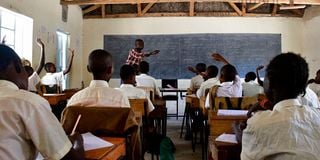Host junior schools in day secondary

Grade Seven students at Ilmarba Junior Secondary School in Matapato North Ward in Kajiado County during a lesson.
The recent damning revelation by the Daily Nation of the deplorable state of public junior school (JS) class, which is domiciled in government primary schools, was worrying. As a new class transitions in January, the situation might worsen.
Top among the avalanche of challenges bedeviling JS is lack of infrastructure. Most primary schools are largely dilapidated with no capacity to carry the weight of the practical-heavy Competency-Based Curriculum (CBC) to achieve its envisaged outcomes. Hence, the education offered there is severely compromised.
Secondly, the biting teacher shortage is taking a heavy toll on JS. The few teachers are handed unreasonably heavy workloads and have to teach subjects they are not trained in. The gap between these teachers’ remuneration vis-a-vis their work contribution is shockingly discriminatory, demotivating them.
Teacher interns have complained of being shortchanged and disenfranchised as they cannot apply for permanent and pensionable replacement posts as the employer, Teachers Service Commission (TSC), prefers non-interned fresh graduates.
That has frustrated them, which has inevitably cascaded to their learners. Their reported frosty relations with the head teachers in the respective primary schools add insult to injury.
The implementation of CBC in junior schools is bogged down by the unconducive public primary school environment. The government must bite the bullet and admit that domiciling JS in the primary section was a blunder that must be rectified.
If the schools are moved to the nearest day secondary school, the learners will be exposed to enough resources, saving the government money that can be redirected to improving the curriculum delivery. The pool of specialist teachers, laboratories and classrooms will avert a disaster.
In rare cases where there is no day secondary school nearby, the government should establish stand-alone, ring-fenced junior schools and hire adequate personnel to independently manage them.
- Mr Mwirichia is a high school teacher. [email protected].





